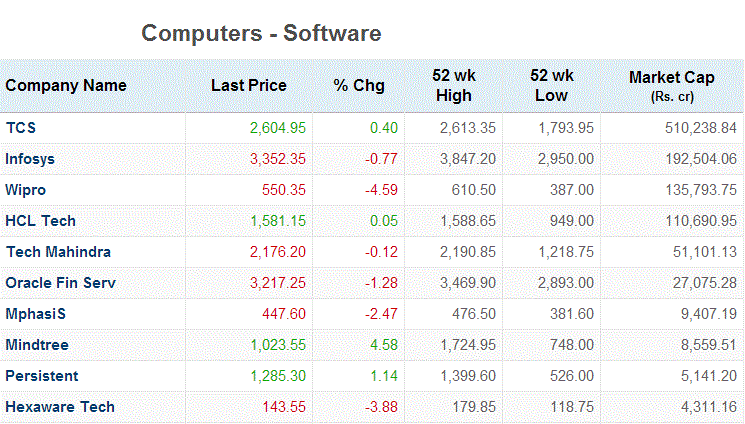I have to admit that I am not a fan of technology companies simply because my background is not technology and I am not particularly interested in learning about
what these businesses do.
Nonetheless, when an Indian outsourcing company whose business was skilled labor arbitrage is making headlines regarding its size, it is a matter of some interest.
As per the PwC report the top technology companies by market capitalization as of 31 March 2014 are as follows:
I am not sure whether MasterCard is a technology business, that's not relevant though. Let's leave out TCMC as well. We have then SAP at $99 b of market value. Compare this to
TCS which is now worth about $85 b (Rs.5,104 b). Is this a fair game?
This report says that it could reach a market valuation of $100 b.
Before we discuss the story behind the game, let's look at some data.
TCS is now by far the largest company in terms of market cap in India:
Its stock performance in the past five years has been outstanding:

All the reasons to cheer for the shareholders. However, when market value of its equity was about
$65 b in October 2013 I argued that it was overvalued. There is no vindication as yet. Who is going to talk to the markets?
I had asked, is TCS worth $65 b? Now the same question looms, is TCS worth $85 b? Let's check its fundamentals, that is, its capacity to grow its cash flows.
TCS has shown impressive margins and return on capital over the years. It has also managed to keep taxes down - with an average effective tax rate much lower than the marginal tax rate.
Its free cash flow to firm (FCFF) has grown from Rs.12 b in 2006 to about Rs.124 b in 2014.
There is no debate: Historical performance of TCS has been quite good, and naturally, the market has rewarded its stock too. Currently it trades at a PE ratio of over 25 which is close to its historical high PE ratio.
Our next analysis is to assess its growth rate and growth period - at what rate will TCS grow from now until it becomes a mature business, and when will it become a mature business? There are no easy answers to these questions.
There is another way: It is far convenient to question the market's valuation rather than making predictions (on cash flows and growth) on our own especially for an information technology business. So here I go:
Assuming that TCS will continue (will it?) its show over the next ten years - the current return on capital of 58.61% will be sustained over five years, reducing over the next five years to reach a stable period return on capital of 25% at perpetuity. Pretax operating margin of 29.10% over five years, reducing over the next five years to reach a stable period margin of 20% at perpetuity. Effective tax rate increasing over the period to reach the marginal tax rate at year 11 - to get to the current market valuation of equity at Rs.5,104 b, TCS has to grow over 26% in the first five years and over 15% in the next five years. I usually do not violate the terminal period assumptions on growth rate, margins and return on capital, yet, I do consider that perpetual margins and return on capital assumed for TCS are more than modest.
Now, we can rephrase our original question from, is TCS worth $85 b to can TCS grow at 26% in the first five years and at 15% in the next five? Also, can it continue to sustain its high operating margin and return on capital?
The market has its own reason:
It is left to the investors to make a call on this, although it is worth noting that its revenue should reach Rs.5,576 b in the next 10 years with those growth rates. Is that possible? Sure; but, I am not going to bet on that.







